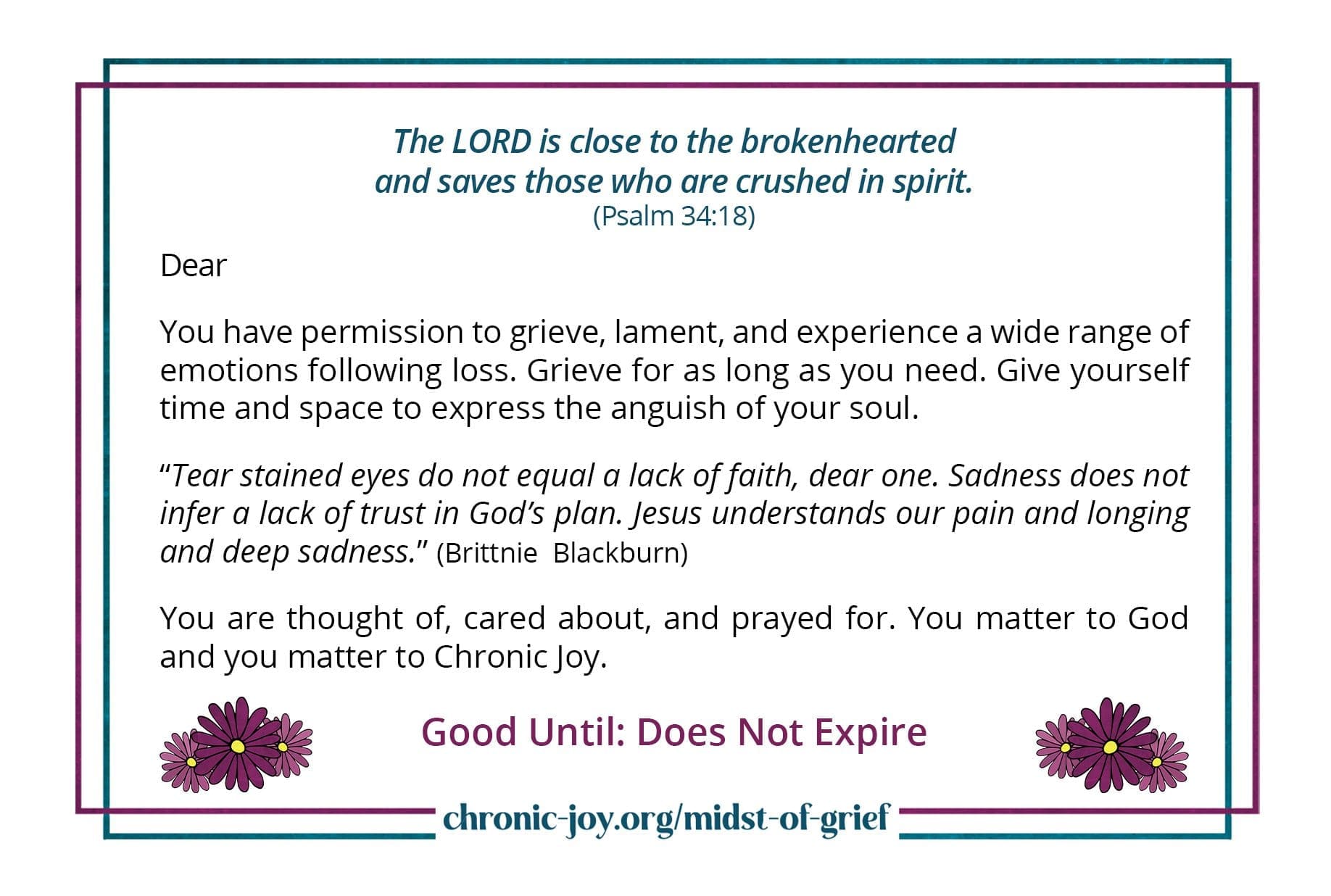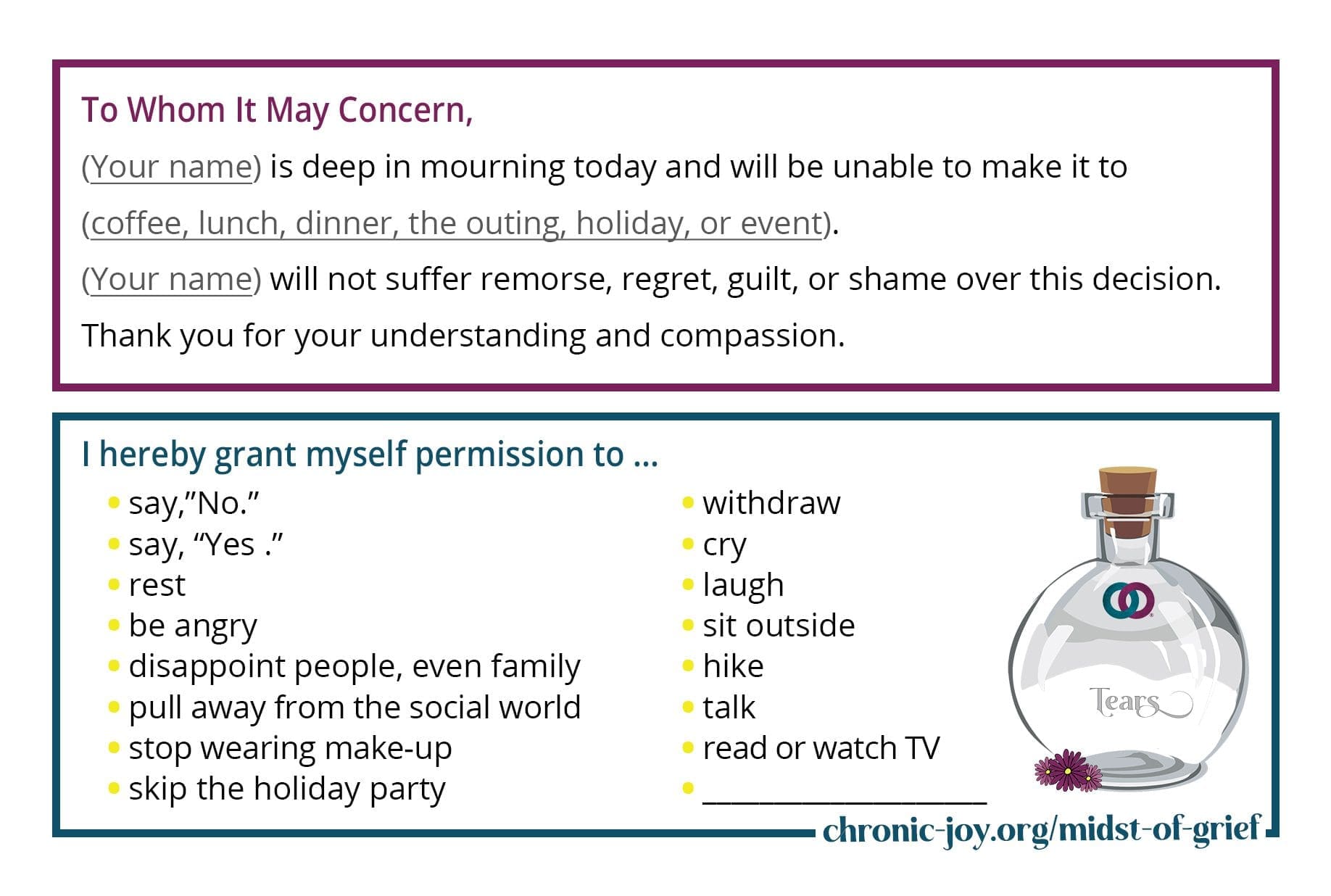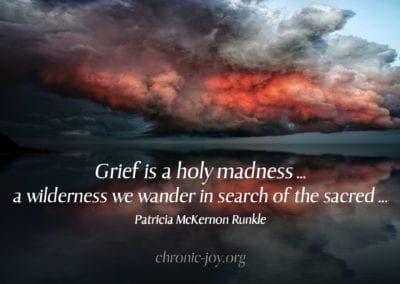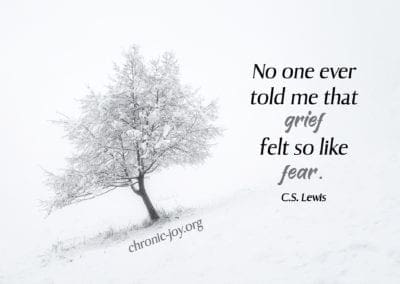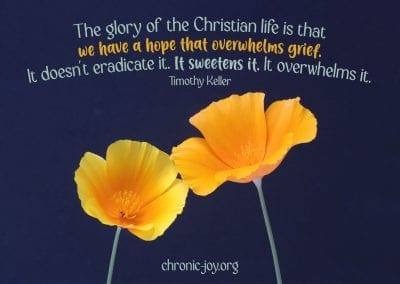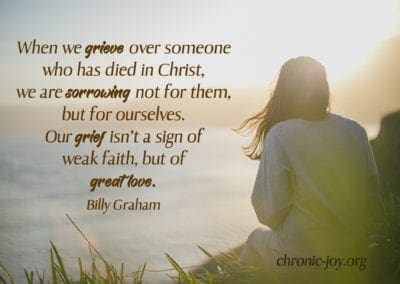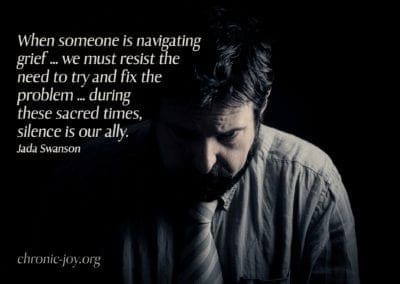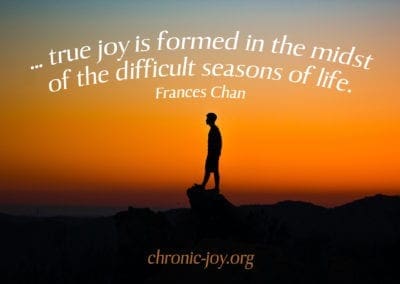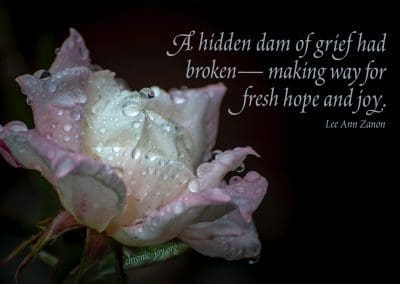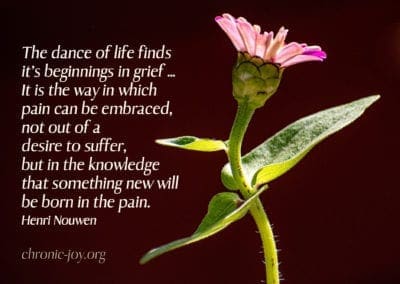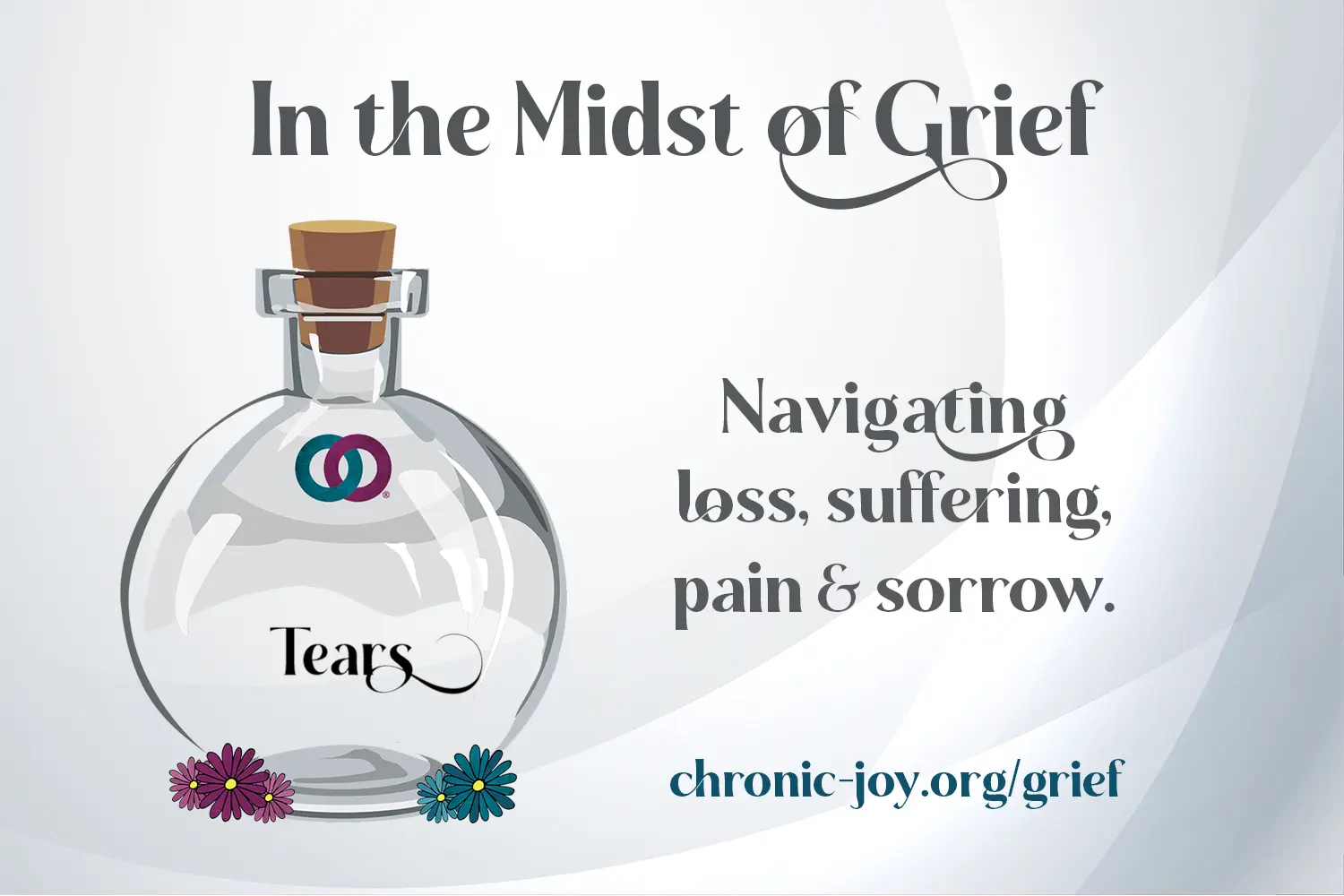
In the Midst of Grief
Mourning Our Losses
Grief is no stranger to those of us affected by chronic illness, mental illness, pain, and suffering. While there are no rules for grieving chronic loss, there is a road map and there are fellow travelers ahead and behind us on the journey. Grief often precedes growth.
Now is your time of grief, but I will see you again and you will rejoice, and no one will take away your joy. (John 16:22)
“Grief is a holy madness.
It is not a puzzle to be solved,
a problem to be overcome,
or a situation to be managed.
It is a wilderness we wander in search of the sacred …”
Patricia McKernon Runkle
GRIEF IS UNIVERSALLY SHARED AND UNIQUELY INDIVIDUAL
Grief is a universally shared human experience, both unavoidable and uniquely individual. Life on this spinning blue planet is replete with loss.
Loss of:
- Relationships
- Community
- Health
- Independence
- Memory
- Mobility
- Those we love and hold most dear
- Sight or Hearing
- Employment
- Financial resources
- Hobbies and recreational activities
- Home
- Educational opportunities
- Serving in what we enjoyed or to which we felt called
Every loss results in grief, though we don’t often recognize that anger, denial, depression, and guilt can be further losses of unresolved grief in chronic illness. These unrecognized losses are known as infinite losses, chronic sorrow, and disenfranchised grief.
Mila Tecala, a Licensed Independent Clinical Social Worker who founded the Center for Loss and Grief in Washington, DC, wrote, “For people who are chronically ill, the losses are multiple and permanent and therefore difficult to resolve. Because these losses are unending, they’re known as infinite losses.”
Envelope of Comfort
REQUEST your free grief resources.
Limit one – US, CA & UK.
SECONDARY LOSSES
Culturally, we make space for grief following the death of a loved one, but rarely recognize that same need in chronic illness.
“… secondary losses,” writes Katrina Zulak, “can fracture self-identity and diminish self-esteem.”
Frances Weller adds, “We cannot grieve for something that we feel is outside the circle of worth. That is our predicament; we are chronically sensing the presence of sorrow but we are unable to truly grieve because we feel … that this piece of who we are is unworthy of our grieving over.”
Yet losses that are not recognized as worthy of acknowledging don’t just slip quietly away. They smolder beneath the surface, bubbling up into anxiety and depression, spewing into anger and frustration, or slowly burning away our sense of self, leaving behind the barren ashes of insecurity, shame, or worthlessness.
God offers us a better way.

GRIEF IS A JOURNEY
The word grief is derived from the Latin word gravis meaning heavy, and from which we get the word gravity. Grief is a journey into the depths, heavy and unavoidable, but it is also a precious reminder of our love persevering. We grieve deeply the people we loved, the things that brought us joy, the pieces of ourselves, and our lives that we held most dear.
“Each person’s grief is as unique as their fingerprint,” writes David Kessler, “but what everyone has in common is that no matter how they grieve, they share a need for their grief to be witnessed. That doesn’t mean needing someone to try to lessen it or reframe it for them. The need is for someone to be fully present to the magnitude of their loss without trying to point out the silver lining,”
No matter what kind of loss we experience, our grief is valid, and we long for the presence of others with us as we process it.
When we search the Bible, we discover we are not alone in our grief:
- Jacob grieved the loss of his son Joseph. (Genesis 37:34-35)
- Job grieved for his children, his reputation, his wealth, and his health. (Job)
- David grieved the deaths of Saul, Jonathan, Abner, and Absalom. (2 Samuel 1)
- Naomi grieved the deaths of her husband and her sons. (Ruth 1)
- “Jesus wept” over the death of his friend Lazarus, John 11:35, and the faithlessness of Jerusalem. (Matthew 23:37-39)
There are, and always have been, fellow travelers in this valley of grief with us – some ahead, some behind, and some beside us – and God’s Spirit is in us, as near as the beating of our very own hearts.
He is with us in every tear, with us in our anger and denial, with us in our sadness, with us when we are beyond words, with us in every moment of our grief. “… the Spirit himself intercedes for us with groans too deep for words.” (Romans 8:26)
THE PARADOX OF GRIEF
Grief is not a denial of the hope we have in Jesus. Instead, it is part of our humanity and proof of our love persevering.
“If I want to feel the depth of joy, ” writes Rachel Wright, ” I must also sit in the heartbreak and pain. If I numb one, I will, in turn, be numbing it all.”
Tim Challies adds, “Christians experience grief but without despair, sorrow but without defeat, sadness but without hopelessness. It’s true sorrow and true hope. These things don’t cancel out one another. We feel the great weight of sorrow and the great thrill of hope. In moments of deep sadness, we feel both.”
THE UNEXPECTED HARVEST OF CHRONIC SORROW
“Chronic sorrow is heavy,” writes Andrea Foster. “It shows up boldly and uninvited … Circumstances vary, but the moments of inexplicable grief that suddenly grip us are a common bond.”
Chronic sorrow is defined as: “A cyclical, recurring, and potentially progressive pattern of pervasive sadness that is experienced by a parent or caregiver, or an individual with chronic illness or disability in response to continual loss, throughout the trajectory of an illness or disability.” Medical Dictionary, 2009 Farlex and Partners
Ken Doka calls this kind of loss disenfranchised grief: grief that is unacknowledged, invalidated, minimized, or misunderstood by others, contributing to anxiety, depression, diminished self-worth, insomnia, shame, and substance misuse.
“Grieving is hard, but disenfranchised grief can be traumatizing,” adds Daja Mayner, MSW, LCSW.
Yet God gently reminds us that grief is also the precursor of hope: “Unless a grain of wheat falls into the earth and dies, it remains [just one grain; it never becomes more but lives] by itself alone. But if it dies, it produces many others and yields a rich harvest.” (John 12:24)
THE CYCLE OF CHRONIC SORROW
- Loss and grief are a difficult yet normal part of life. Acknowledging how we feel as honestly as possible is a necessary first step. As our symptoms wax and wane, or we cycle into and out of remission, we become familiar with the cycle of sorrow.
- As we recognize familiar patterns, we’re reminded that we’ve felt this before, that we’ve navigated this cycle and survived.
- Rest is very important. Both illness and grief are physically, emotionally, and spiritually exhausting. Sometimes the most beneficial thing we can do is rest.
- Reach out. Call, text, email, or write a #PenToPaper letter to a loved one. Shifting the focus for even a few minutes can reframe the day and give our heavy hearts and weary minds a respite.
“Perhaps the most important thing I learned after falling ill,” writes Rachel Tait, “was that allowing myself to grieve was key. I had to give myself time and space to feel all the complex emotions that come with grief and loss of health. There was no rushing myself to feel better. I learned to give myself permission to cry and that it was okay to have days where I felt like I couldn’t go on anymore. Sometimes I just needed to feel that despair before I could process it and move past it.”
MOVING FORWARD WITH GRIEF
“We don’t move on from grief. We move forward with it,” writes Nora McInerny
Jennifer Williamson adds, “When grief is part of your life, you learn how to start all over again – over and over again. And that builds courage …”
Continual, sustained loss (and the grief that follows close on its heels) is one of the most energy-depleting aspects of chronic illness and pain. In the face of constant loss, we begin to ask: “Who am I?” “What is my purpose?” “Where and how do I find new meaning?”
GRIEVING WITH HOPE
God doesn’t condemn our grief and sadness. He knows they are a part of our human experience in this fallen world, but He gently reminds us that through His Son, we grieve with hope.
Grief is a journey requiring steady sips of hope, plates filled with God’s unbroken promises, the comfort of community, replenishing rest, fresh air and sunshine, and the unexpected surprise of a blue-winged butterfly.
In this world, we will experience pain, loss, separation, and death, but a better day is coming, a day when death and brokenness no longer have sway. That is our bright hope as we experience grief and sorrow on this long and winding journey Home.
But in the midst of all this pain, there is a strange, shocking, yet very surprising voice. It is the voice of the One who says: ‘Blessed are those who mourn; they shall be comforted.’ That’s the unexpected news: there is a blessing hidden in our grief. Not those who comfort are blessed, but those who mourn! Somehow, in the midst of our tears, a gift is hidden. Somehow in the midst of our mourning, the first steps of the dance take place. Somehow, the cries that well up from our losses belong to our songs of gratitude. (Henri J.M. Nouwen)

Grief is a Holy Madness
“Grief is a holy madness … a wilderness we wander in search of the sacred …” (Patricia McKernon Runkle)
Hope That Overwhelms Grief
“The glory of the Christian life is that we have a hope that overwhelms grief. It doesn’t eradicate it. It sweetens it. It overwhelms it.” (Timothy Keller)
Grief is Great Love
“When we grieve over someone who has died in Christ, we are sorrowing not for them, but for ourselves. Our grief isn’t a sign of weak faith, but of great love.” (Billy Graham)
Sing Sad Songs
“When you sing your sad songs, I will learn the words and sing along.” (Ellie Holcomb)
Navigating Grief
“When someone is navigating grief … we must resist the need to try and fix the problem … during these sacred times, silence is our ally.” (Jada Swanson)
True Joy Difficult Seasons
“… true joy is formed in the midst of the difficult seasons of life.” (Frances Chan)


